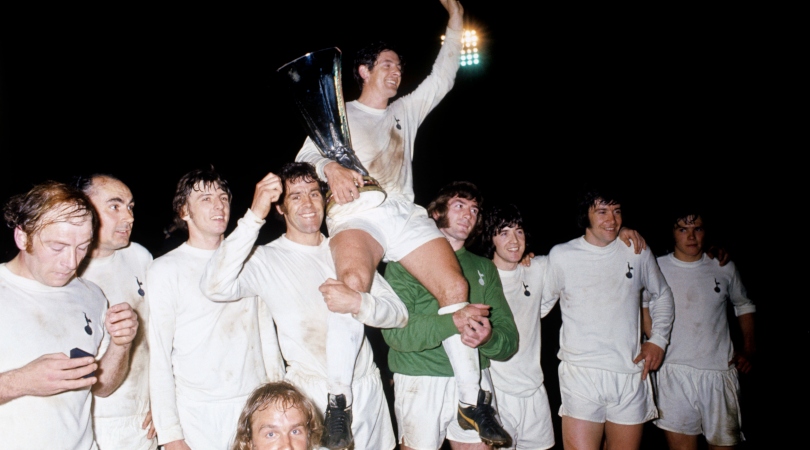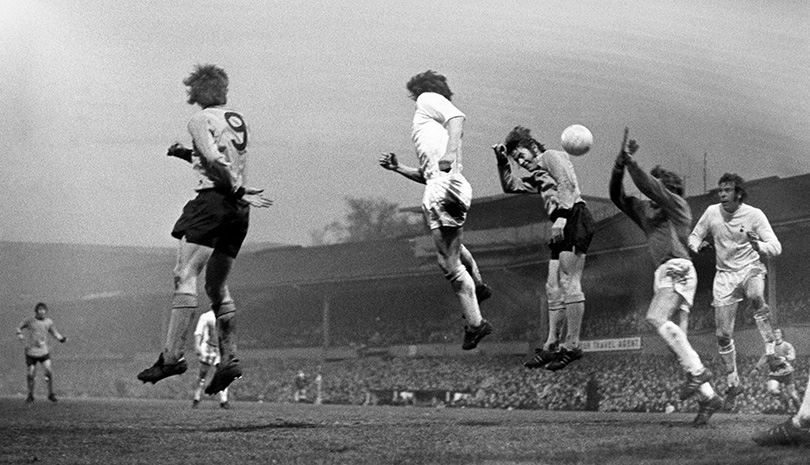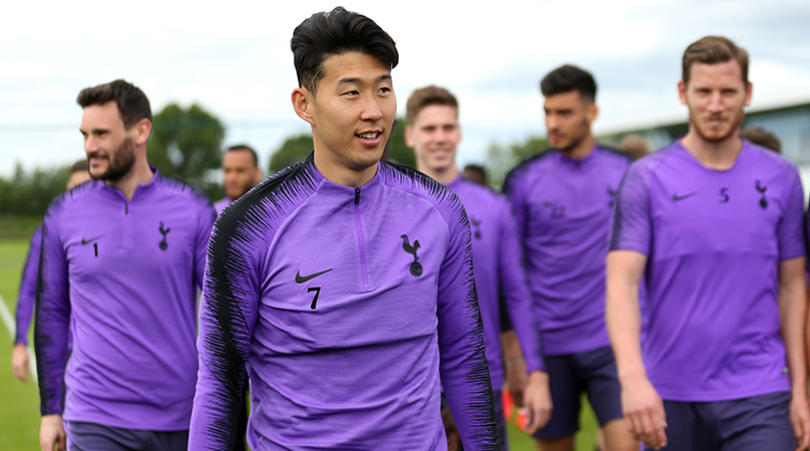How an all-English European final stretched all the way from London to… Wolverhampton
Fans didn’t have so far to travel for the rain-sodden 1972 UEFA Cup Final between Tottenham and Wolves – and they still complained

It’s 19th April 1972, and a gaggle of footballers’ wives have crammed around a television set to watch the second leg of a UEFA Cup tie that they have more than a keen interest in.
In the weeks previously, some of those watching have been dusting off their Hungarian phrase books. The bookshops of Tottenham High Road, meanwhile, have been doing a brisk trade in travel guides for Budapest. All that stands between the wives of Spurs and an all-expenses-paid trip behind the Iron Curtain to the away leg of the UEFA Cup final are those boys from the Black Country.
“Our wives were promised it if we ever reached there,” recounted former Spurs striker Martin Chivers in an interview with UEFA in 2015. “So they started dreaming of Madrid and Paris and Rome. And where did we finish? They weren’t enamoured to go to Wolverhampton.”
That’s not to say you couldn’t have a wild night out in the city: just ask the Juventus players who were fined by their club, having overstayed their welcome in a local watering hole following their quarter-final clash at Molineux the previous month.
For both the players and wives of a club seeking to become the first English side to win two European titles, the first all-English final in a European competition was hardly the tie that they had been holding out for. That said, Wolves had already enjoyed a continental trek to remember.
“It had been amazing,” says Kenny Hibbitt, who played in the match and would go on to make almost 500 appearances for the club between 1968 and 1984.
“Before I joined Wolves it was Halifax, Rochdale and Sunderland reserves. Then three years down the line I was travelling all over Europe. It was magnificent, I loved every minute of it.”
Get FourFourTwo Newsletter
The best features, fun and footballing quizzes, straight to your inbox every week.

It wasn’t just the players who had relished the experience: Wolves fans had also made the most of trips to Portugal, Holland, East Germany, Italy and Hungary. But a date in north London rather than Milan – the team Spurs had beaten in the last four – didn’t exactly feel them with glee either.
“We were absolutely horrified,” says lifelong Wolves fan, John Lalley. “We were all praying that Spurs were going to lose to Milan in the semi-finals, not least because Wolves didn’t get beaten away in the whole competition. They went to Juventus, they went to Carl Zeiss, the Hague, Ferencvaros, Portugal, everywhere.
“It was significant that the attendance at Molineux for the final was something like 38,000, while the crowd for the Juve game was well over 40,000.”
If the prospect of an all-English final hadn’t gone down well in either north London or the Black Country, then you can only imagine the mood at UEFA HQ; European football’s governing body had taken over running the old Inter-Cities Fairs Cup and re-branded it as the UEFA Cup at the end of the previous season.
A glitzy first-round tie on a rain-swept night in Wolverhampton probably wasn’t the scenario they had in mind at the outset. But even after these Euro bigwigs had spat out their cappuccinos, adjusted their Armani suits and raised a glass of vintage champagne to these continental party-poopers – it would, after all, be another seven months before Great Britain joined the EU – they were probably unsurprised to see that excitement levels elsewhere in England hadn’t risen too much either.
In an unfortunate but not entirely out-of-keeping piece of scheduling nonsense, the first leg took place just five days after England’s Euro ’72 quarter-final against West Germany at Wembley – a match which, unlike the UEFA Cup final, had captured the imagination of a football-loving public convinced that the Three Lions were in with a shot of being crowned European champions, six years after conquering the world.
Bill McGarry, Wolves’ notoriously hard manager, even referred to the match as the ‘Forgotten Final’ in the days running up to the opening clash at Molineux. “It’s a great pity,” he said. “I think it’s a wonderful feat by both Wolves and Tottenham to have battled their way through to the first ever European final between two English clubs. I believe we should have been playing at Wembley in midweek. And in one game not over two legs.”
Given the inclemency in the skies overhead on a truly horrendous evening at Wolves’ famous old ground, most of those present would doubtless have agreed.
“It was played on a filthy night,” says Lalley. “I was on the South Bank, the big massive terrace. When it rained, the crowd used to congregate at the back under the roof.
“I remember staying at the front and I literally could have walked five or six yards either side of me. I was watching Wolves in a European final but it was like being at a Central League match.”
In the tunnel, waiting to crown an unlikely rise from anonymity was Hibbitt.
“I was nervous, always nervous before kick-off,” he says. “And this was without doubt the biggest game of my career. For the players it didn’t really matter that we were playing another English side. We just wanted to go out there and win a European trophy. It was a huge, huge night.”
As the rain lashed down, though, it was the visitors who took the lead. Chivers had netted for Spurs on his three most recent trips to Molineux and he was about to maintain that run, heading in for the visitors on 57 minutes.
Roared on by the damp locals, Wolves then equalised 15 minutes later.
“They literally had mugged us,” said Chivers. “They caught us very cold and Bill Nicholson would have been fuming, I know he would have been, on the line.”
That goal from Jim Calliog – who would go on to win an FA Cup winners’ medal with Southampton four years later – had the home side sniffing parity with the second leg at White Hart Lane looming into view.
Enter Chivers again, with the then-27-year-old lashing past Phil Parkes in the Wolves goal to seal a 2-1 win with a priceless second away goal.
The travelling Spurs supporters were understandably jubilant but in the rest of the country – not to mention the rest of Europe – ambivalence was probably the overriding emotion. Not that the Spurs players, who enjoyed a sherbet or two on the train back to London, were remotely bothered. Given the green light to let their hair down by the Spurs boss, the players stayed in their carriage for 20 minutes after the train had pulled into St Pancras before realising that they had arrived back in the smoke.
The second leg, like the first, did little to quicken pulses, but after Allan Mullery scored to put Spurs 3-1 up in the tie after 29 minutes, it suddenly sparked into life. Dave Wagstaffe scored a stunning equaliser on the night to breathe fresh life into the match as Spurs wobbled.
“The man who stood out as the saviour when Wolves settled down to play with great composure and cunning in the second half was goalkeeper Pat Jennings,” reported the man at the Mirror.
In the end, the Northern Irishman’s excellence had ensured Spurs’ a place in history – Nicholson’s side became the first English team in history to win two separate European trophies, with the UEFA Cup adding to a cabinet that already included the 1963 European Cup Winners’ Cup.
“I think over the two legs, Spurs just about edged it,” says Hibbitt. “I’ve got my UEFA medal behind me now as we’re talking and I’m so proud of it. As a young kid I never expected that. I never dreamed of playing in a UEFA Cup final.”
And if those wives are still seeking solace 47 years on, then this year just about provides it. Given a choice between a trip to Wolverhampton or Baku, which would you choose?
While you're here, why not take advantage of our brilliant subscribers' offer? Get 5 copies of the world's greatest football magazine for just £5 – the game's greatest stories and finest journalism direct to your door for less than the cost of a London pint. Cheers!
NOW READ...
Olivier Giroud: the World Cup-winning stopgap who has never quite found his place
Quiz! Can you name Petr Cech's 50 most frequent Arsenal/Chelsea team-mates?

